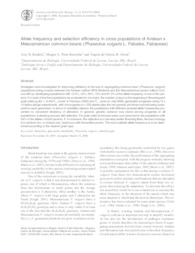Allele frequency and selection efficiency in cross populations of Andean x Mesoamerican common beans (Phaseolus vulgaris L. Fabales, Fabaceae).
Allele frequency and selection efficiency in cross populations of Andean x Mesoamerican common beans (Phaseolus vulgaris L. Fabales, Fabaceae).
Author(s): BALDONI, A. B.; RAMALHO, M. A. P.; ABREU, A. de F. B.
Summary: Strategies were investigated for improving efficiency in the use of segregating common bean (Phaseolus vulgaris) populations using crosses between the Andean cultivar BRS-Radiante and the Mesoamerican parent cultivar Carioca-MG by developing populations with 12.5%, 25%, 50%, 75% and 87.5% of the allele frequency of one of the parents. For each of the five populations we evaluated for two traits, the number of days to the beginning of flowering and grain yield (g plot -1), in the F2:3 (sown in February 2006) and F2:4 (sown in July 2006) generation progenies using 15 x 15 lattice design experiments, with 44 progenies (n = 220 plants) plus the two parents and three controls being evaluated for each generation. In terms of variability release, the populations with different parental allele frequencies presented no consistent tendency of alteration. In general, genetic variance was stated among progenies in all populations, indicating success with selection. For grain yield, the lowest mean was observed in the populations with 50% of the alleles of both parents. If, for instance, the objective is to develop earlier flowering lines, the best strategy is to perform two, or at least one, backcross with the earliest parent. The most suitable allele frequency is to be determined according to the desired grain type.
Publication year: 2008
Types of publication: Journal article
Unit: Embrapa Rice & Beans
Observation
Some of Embrapa's publications are published as ePub files. To read them, use or download one of the following free software options to your computer or mobile device. Android: Google Play Books; IOS: iBooks; Windows and Linux: Calibre.
Access other publications
Access the Agricultural Research Database (BDPA) to consult Embrapa's full library collection and records.
Visit Embrapa Bookstore to purchase books and other publications sold by Embrapa.

